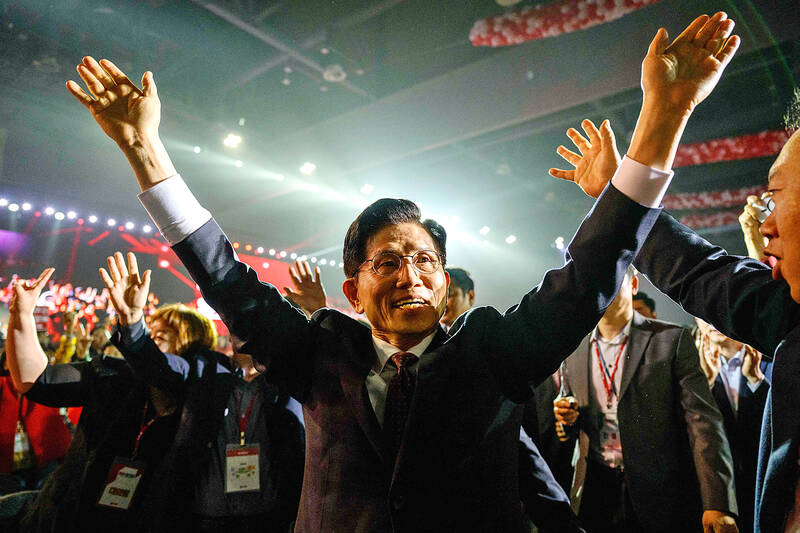Former South Korean minister of labor Kim Moon-soo, 73, won the presidential nomination of South Korea’s main conservative party, the People Power Party (PPP), and is facing an uphill battle against liberal front-runner, Democratic Party leader Lee Jae-myung, for the June 3 election.
Observers say Kim would likely try to align with other conservative forces, such as former South Korean prime minister Han Duck-soo, to prevent a split in conservative votes in a bid to boost prospects for a conservative win against Lee.
In a party primary that ended yesterday, Kim won 56.5 percent of the votes cast, beating his sole competitor, former PPP leader Han Dong-hun, the party said in a televised announcement. Other contenders have been eliminated in earlier rounds.

Photo: AFP
“I’ll form a strong alliance with anyone to prevent a rule by Lee Jae-myung and his Democratic Party forces. I’ll push for that in a procedure and method that our people and members accept, and I’ll ultimately win,” Kim said in his victory speech.
Kim served as a governor of Gyeonggi province and a member of the National Assembly for three terms. Kim was originally a pro-democracy and labor activist, but joined a conservative party in the 1990s.
The June 3 election is meant to find a successor to former South Korean president Yoon Suk-yeol, a PPP member who was impeached and removed from office early last month over his ill-fated Dec. 3 imposition of martial law.
Kim has opposed parliament’s impeachment of Yoon, although he said he respects a South Korean Constitutional Court ruling that formally dismissed Yoon as president.
Yoon’s impeachment is a major source of feuding at the PPP and a hot topic at the party’s primary.
Han served as Yoon’s first minister of justice. He leads a reformist yet minority faction at the PPP that joined the liberal opposition in voting to overturn Yoon’s martial law decree and later impeach him. Without the support of Han’s faction members, an opposition-led impeachment motion on Yoon could not have passed through the National Assembly, because opposition parties were eight votes short of a two-thirds majority to approve it.
Lee is the clear favorite to win the election, but he stands a total of five criminal trials over corruption and other charges. If Lee becomes president, those trials would likely stop, as he would enjoy presidential immunity from most criminal prosecutions.
Lee’s campaign experienced a setback due to a recent South Korean Supreme Court decision to order a new trial on his election law charges. It is unclear if he will face a court sentence that requires the suspension of his campaign before the June 3 vote, but he would likely grapple with an intense political offensive by his election rivals.

‘TERRORIST ATTACK’: The convoy of Brigadier General Hamdi Shukri resulted in the ‘martyrdom of five of our armed forces,’ the Presidential Leadership Council said A blast targeting the convoy of a Saudi Arabian-backed armed group killed five in Yemen’s southern city of Aden and injured the commander of the government-allied unit, officials said on Wednesday. “The treacherous terrorist attack targeting the convoy of Brigadier General Hamdi Shukri, commander of the Second Giants Brigade, resulted in the martyrdom of five of our armed forces heroes and the injury of three others,” Yemen’s Saudi Arabia-backed Presidential Leadership Council said in a statement published by Yemeni news agency Saba. A security source told reporters that a car bomb on the side of the road in the Ja’awla area in

PRECARIOUS RELATIONS: Commentators in Saudi Arabia accuse the UAE of growing too bold, backing forces at odds with Saudi interests in various conflicts A Saudi Arabian media campaign targeting the United Arab Emirates (UAE) has deepened the Gulf’s worst row in years, stoking fears of a damaging fall-out in the financial heart of the Middle East. Fiery accusations of rights abuses and betrayal have circulated for weeks in state-run and social media after a brief conflict in Yemen, where Saudi airstrikes quelled an offensive by UAE-backed separatists. The United Arab Emirates is “investing in chaos and supporting secessionists” from Libya to Yemen and the Horn of Africa, Saudi Arabia’s al-Ekhbariya TV charged in a report this week. Such invective has been unheard of

US President Donald Trump on Saturday warned Canada that if it concludes a trade deal with China, he would impose a 100 percent tariff on all goods coming over the border. Relations between the US and its northern neighbor have been rocky since Trump returned to the White House a year ago, with spats over trade and Canadian Prime Minister Mark Carney decrying a “rupture” in the US-led global order. During a visit to Beijing earlier this month, Carney hailed a “new strategic partnership” with China that resulted in a “preliminary, but landmark trade agreement” to reduce tariffs — but

SCAM CLAMPDOWN: About 130 South Korean scam suspects have been sent home since October last year, and 60 more are still waiting for repatriation Dozens of South Koreans allegedly involved in online scams in Cambodia were yesterday returned to South Korea to face investigations in what was the largest group repatriation of Korean criminal suspects from abroad. The 73 South Korean suspects allegedly scammed fellow Koreans out of 48.6 billion won (US$33 million), South Korea said. Upon arrival in South Korea’s Incheon International Airport aboard a chartered plane, the suspects — 65 men and eight women — were sent to police stations. Local TV footage showed the suspects, in handcuffs and wearing masks, being escorted by police officers and boarding buses. They were among about 260 South